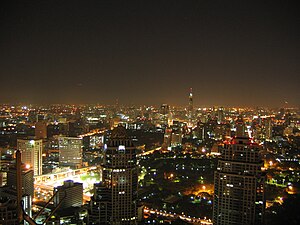 Image via Wikipedia Image via Wikipedia |
| Bangkok, Thailand |
A March 29, 2011 press release prepared by the Department of Foreign Affairs
The Philippine Embassy in Bangkok reported that overseas Filipino workers (OFWs) in Thailand were informed of their rights under the Thai Social Security Act during a seminar organized by the Embassy in collaboration with the Thai Social Security Office (SSO).
The seminar was held at the Embassy conference room on March 19.
The seminar is a continuation of the Embassy’s seminar series on issues and concerns affecting the Filipino community in Thailand.
About 50 to 60 members of the Filipino community in Thailand attended the seminar. They showed considerable interest in the topic, especially on the proposed Social Security Agreement between the Philippines and Thailand.
SSO International Affairs Division Chief Chantana Boon-Arj gave an extensive briefing on the Thai Social Security Act for members of the Filipino community in Thailand.
During the seminar, Ms. Chantana explained that the Social Security Act of Thailand covers enterprises with one or more employees throughout the country.
She added that social security coverage is mandatory for all employees, regardless of nationality, except for those employed by foreign governments or international organizations, for teachers or headmasters of private schools under the Private School Law, for employees whose employers’ office is in the country but stationed abroad, and for Thai government officials and employees.
Ms. Chantana informed the audience of the benefits under the Thai Social Security Act and how to apply for them.
The benefits include sickness benefit (free medical care at any registered hospital), maternity benefits, invalidity (50 percent of wages for the whole life in case of permanent disability), death benefits (funeral grant of 40,000 Baht; grant fund for survivors), child allowance (of 350 Baht per child per month, up to 2 children), old age pension (the retirement age in Thailand is 55 years), and unemployment benefits (30 or 50 percent of wages up to 90 days or 180 days, depending on the cause of unemployment).
Ms. Chantana said that Thai Social Security is very much like the Philippines Social Security System. Under the Thai Social Security Act, however, the Thai government contributes to the Social Security Fund unlike in the Philippines where only the employer and the employees contribute.
While many OFWs in Thailand work as teachers in private schools and are, therefore, not covered by the Thai Social Security Act, still there are many other OFWs who are covered but came to realize this only after attending the seminar.
Some of those who attended said that it was their first time to hear about the Thai Social Security Act and to learn about their rights under it. Others said they would not have known how to avail themselves of their benefits under the Act had they not attended the seminar.
Ms. Chantana gave the Embassy a booklet containing the contact details of SSO’s offices in Bangkok and in all the 75 provinces of Thailand. She also left copies of claim forms translated into English for members of the Filipino community who might need them.
The Embassy organized the seminar on Thailand’s Social Security System as one of the initial steps towards concluding a Social Security Agreement between the Government of the Philippines and the Royal Kingdom of Thailand.
Such an agreement would enable Filipinos now working in Thailand and who contribute to the Thai Social Security to carry and enjoy their Thai social security benefits if and when they return to the Philippines for brief visits or permanently. In other words, the Agreement would ensure portability and continuity of the Thai Social Security benefits in case a member changes his or her place of work or residence.






No comments:
Post a Comment